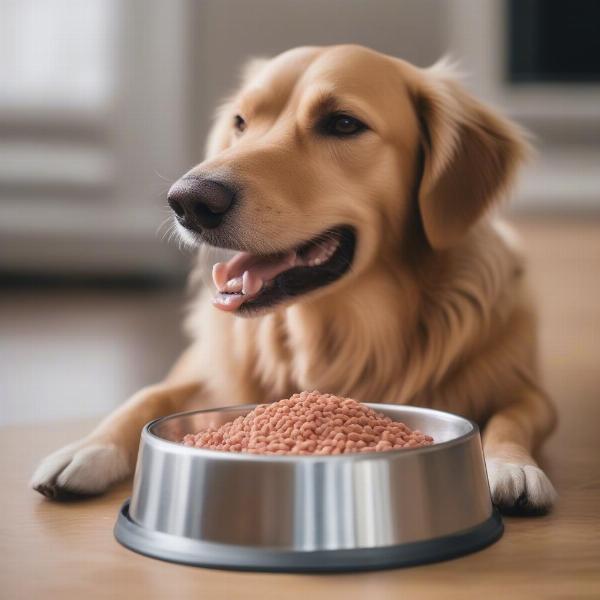Salmon grain-free dog food is a popular choice for pet owners seeking a healthy and natural diet for their furry friends. But is it the right choice for your dog? This comprehensive guide dives into the benefits, potential drawbacks, and everything you need to know about salmon grain-free dog food, helping you make an informed decision for your canine companion.
The Benefits of Salmon Grain-Free Dog Food
Salmon is a nutritional powerhouse, packed with omega-3 fatty acids EPA and DHA. These essential fatty acids contribute to healthy skin and a glossy coat, while also supporting cognitive function and joint health. Grain-free formulas cater to dogs with grain sensitivities or allergies, often resulting in improved digestion and reduced skin irritation. Many grain-free options also incorporate other high-quality ingredients like fruits, vegetables, and probiotics for added nutritional value. This can lead to increased energy levels, better weight management, and a stronger immune system.
Potential Drawbacks of Grain-Free Diets
While salmon grain-free dog food offers numerous advantages, it’s important to be aware of potential drawbacks. Some dogs may experience digestive upset when transitioning to a new diet, especially if the change is abrupt. Start by gradually introducing the new food, mixing it with their current food and slowly increasing the proportion over several days.
Another concern surrounding grain-free diets is the potential link to dilated cardiomyopathy (DCM), a serious heart condition. While research is ongoing, it’s crucial to discuss any dietary changes with your veterinarian, especially if your dog has a history of heart problems. Choosing a reputable brand that prioritizes quality ingredients and follows AAFCO guidelines can also help minimize potential risks.
Choosing the Right Salmon Grain-Free Dog Food
The pet food market is flooded with options, making it challenging to select the best salmon grain-free food for your dog. Look for formulas that list salmon as the primary ingredient, indicating a higher concentration of this valuable protein source. Avoid foods with artificial colors, flavors, and preservatives. Consider your dog’s age, breed, activity level, and any specific health needs when choosing a formula. Puppies, senior dogs, and active breeds may require different nutrient profiles. taste of the wild dog food puppy
Transitioning to Salmon Grain-Free Dog Food
Introducing a new food should be a gradual process. Mix a small amount of the new food with your dog’s current food, gradually increasing the ratio over 7-10 days. Monitor your dog closely for any digestive issues like vomiting, diarrhea, or changes in stool consistency. If you notice any problems, consult your veterinarian. They can provide guidance and recommend alternative options if necessary. the great canadian dog food
Is Salmon Grain-Free Dog Food Right for My Dog?
Salmon grain-free dog food can be a healthy and beneficial option for many dogs, especially those with grain sensitivities. However, it’s crucial to consider the potential drawbacks and choose a high-quality formula. Consulting with your veterinarian is always recommended before making any significant dietary changes. They can help determine if a salmon grain-free diet is the best choice for your dog’s individual needs. proplan dog food
 Dog Eating Salmon Grain-Free Food
Dog Eating Salmon Grain-Free Food
Conclusion
Salmon grain-free dog food offers a nutritious and palatable option for many canines. By understanding the benefits, potential drawbacks, and selecting a high-quality formula, you can make an informed decision about whether this diet is right for your furry friend. Remember to always consult your veterinarian before making any major dietary changes. They can provide tailored advice based on your dog’s individual needs and health status. dog food without chicken
FAQ
- What are the main benefits of salmon grain-free dog food? Salmon is rich in Omega-3 fatty acids, which are beneficial for skin, coat, and joint health. Grain-free formulas are also suitable for dogs with grain allergies or sensitivities.
- Are there any risks associated with grain-free diets? Some studies suggest a potential link between grain-free diets and dilated cardiomyopathy (DCM). Consult your veterinarian for advice.
- How do I transition my dog to a new grain-free food? Gradually introduce the new food over 7-10 days, mixing it with their current food and slowly increasing the proportion.
- How can I tell if a salmon grain-free food is high-quality? Look for salmon as the first ingredient and avoid artificial additives. Check for AAFCO compliance.
- Is salmon grain-free food suitable for all dogs? While beneficial for many, it’s not suitable for all. Consult your vet to determine if it’s right for your dog. beef canned dog food
ILM Dog is your trusted source for expert advice on dog care and nutrition. We provide comprehensive resources on dog breeds, health, training, nutrition, and much more. Whether you’re a new dog owner or a seasoned expert, ILM Dog has everything you need to provide the best possible care for your furry friend. Contact us at [email protected] or +44 20-3965-8624 for personalized guidance.